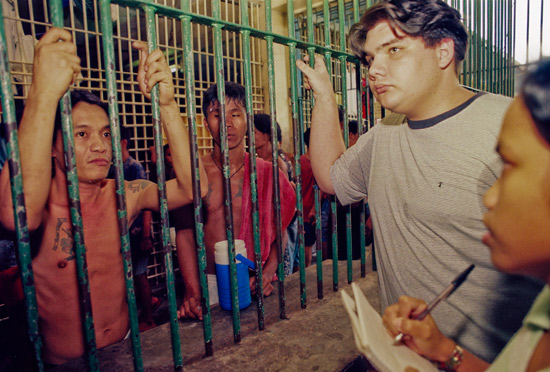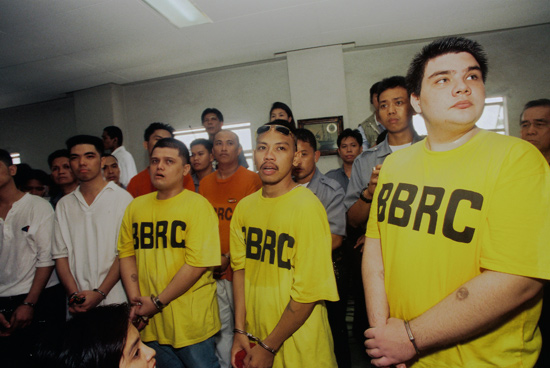Toronto International Film Festival begins tomorrow. Getting you film to a festival is a dream come true for most filmmakers. But it is so easy to overlook the great opportunities that are right before you when you attend a festival. Today, doc filmmaker Michael Collins shares some of the lessons he’s learned from his initial experience at Tribeca.
GIVE UP TOMORROW (Tribeca)
Written by Michael Collins (Director/Producer)
For us, the road to Tribeca was extremely long, and sometimes quite grueling. Give Up Tomorrow is our first documentary feature and it took us more than 6 years to complete. Along the way as we navigated overseas productions, unraveled the mysteries of the funding world, and learned what post-production really entails, there are countless lessons that we learned – most thanks to a supportive community of filmmakers and advisors who have been there for us at every turn. But we quickly realized that the adventure doesn’t end when you finish the film and get into a festival, it is just the mark of a new chapter.
When we got the news that we would be premiering at Tribeca Film Festival, it was truly a dream come true. But along with all the excitement came a healthy dose of fear. We realized we still had a tremendous amount of work ahead of us, and we’d only have one chance to get this right. We immediately reached out to friends and advisors who had premiered at Tribeca in recent years and got some invaluable advice.

By no means are we experts, in fact quite the opposite.
Here are a few things that we feel made our experience at Tribeca a rich one:
We got to know everyone working at the festival
At all festivals there are so many people working tirelessly behind the scenes to give you the best possible launching ground for your film. Introductions are usually made via email, but it’s so much better to put a face to the names. Leading up to the festival make an effort to stop by the offices if you can. Say a quick “Hello” and see if you can help them out in any way. Let them know you are available and eager to participate in any opportunities that arise, such as industry panels. And get to know the volunteers and theater managers at the screening venues. When you do need their help, it will usually be under serious time-constraints, so get to your screening very early and introduce yourself.
Utilize your networks, don’t be afraid to ask for help.
Someone needs to take photos, video, hand out tickets to your guests, etc. You can easily get so caught up in all the legwork surrounding your screenings that you can’t be present to talk with press, talk with key guests, and maybe even enjoy yourself. Reach out to your network and see if you can get a few extra hands to be around at each screening to help with whatever comes up, because something always will.
Hire a professional publicist
For doc filmmakers, a photo finish seems to be the norm, and we were no exception. Finishing a film for most of us means a whole lot of post-production expenses piling up at the very end. Hiring a professional publicist was one of the best decisions we made. We were blown away by Tribeca Film Festival’s press office and all the wonderful exposure they generated for us, but the fact remains we were one of nearly 100 films they were responsible for. We chose to work with veterans Winston and David at David Magdael & Associates. They already had relationships with many of the top publications and media outlets, and they also had a great working relationship with the festival.
Turn each screening into an event
We invited high profile guests to join us, and organized a place to continue the conversation after the screenings. It was especially important to have a private reception following the premiere because we had all our film subjects with us, our family, friends, representatives from our media funders and foundations who supported us over the years. It was important to celebrate together as a way to thank them, and also to reconnect as we start planning for the next phase. Additionally, having this formal event made it easier to invite many key people such as distributers, NGOs, policy-makers, embassies and politicians who could directly impact the issues raised in the film.
A reception venue doesn’t have to be expensive. Take the time to check out the bars and restaurants within walking distance of the theater and get to know the managers. Tell them you have a limited budget and see what they can offer. Ask the festival if they have relationships with certain venues and about potential beverage sponsors. Reach out to your media funders and see if they are able to contribute. If you have a film about a particular issue or cause, reach out to organizations that might want to co-host the event. They may just give you a few hundred dollars, but it all adds up. If you have no budget at all, you can usually work something out with a local bar that would allow you to show up with a big crowd and get discounts on drinks.
Lay the groundwork for a social campaign
If you made a film that you hope will change the world, take the opportunity to establish campaign partnerships early. There is so much excitement and good energy at festival premieres, so be sure to get key people from organizations you are hoping to partner with into that theater. It was at our reception when Larry Cox, the executive director of Amnesty International, was inspired to stand on a chair and give a passionate speech about his commitment to the film and to getting justice for those involved. We had been in conversations with Amnesty ever since we participated in the Good Pitch in 2009, but having him experience the premiere definitely sealed the deal.

Bring partners to every screening
Establishing and maintaining relationships with partner organizations can be time-consuming and take expertise that not all filmmakers have. We decided to make the investment and work with Tracy Fleischman and Lisa Smithline at Cultural Front Productions on this. They helped us formalize the campaign and bring partners to every screening who would join our Q&A discussions. This elevated conversations by exploring larger issues raised in the film, and it also helped to fill seats because these partners were promoting to their networks.
Stay connected with your audiences
If you have a social issue film, audiences are going to want to help immediately. Find a way to harness that positive energy by giving them a call to action. In our case we have audiences sign a petition. We gather their email and give them the opportunity to write a note to Paco, the main subject of our film who is in prison. We now stay connected with the audiences through Facebook, twitter and newsletter updates. As our journey continues, and Paco’s case evolves, they are with us.
I’m writing this from the filmmaker’s café at Dokufest in Kosovo (excited for our outdoor screening tomorrow evening under the stars for 450 people!) and it is exactly 3 months to the day after our premiere. This is our 5th festival and we have many more lined up for the fall. I know that the success of the film today is largely due to the time, energy and resources everyone put into launching at Tribeca. We try to replicate our experience at Tribeca, on a smaller scale, at each new festival. We never just assume that audience will show up, or that the press will feature us, so we do our best to arrive early and get to work. But now we take a little extra time to enjoy these beautiful new cities that we were lucky enough to find ourselves in – because we know this chapter will soon be over as well.
— Michael Collins




